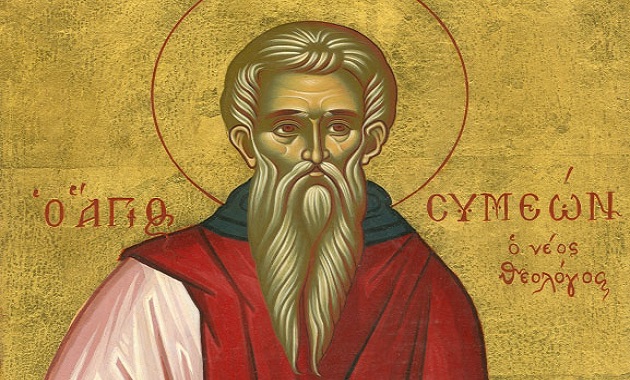Saint Symeon the New Theologian
13 March 2020On the 12th day of this month our Blessed and God-bearing Father Symeon the New Theologian departed in peace (Synaxari, March).
Discourse XI: On Fasting
That we should not embrace and zealously observe the benefit of the fast only in the first week of Lent, but that the zealous should continue in the same zeal for all the weeks of Lent.
Brethren and Fathers,
What we are about to say ought to have been addressed to your goodness last Sunday. I was aware, however, that all Christian people, be they monastics or laity, fervently and willingly welcome the blessing of the fast in the holy first week of Lent and that each of us willingly puts the yoke on their own neck. Even among those who greatly despair of their own salvation and spend their lives without fear and reverence for God, there are none who reject the laws of fasting that week. Rather, they practice abstinence along with everyone else, insofar as they are able. So I come today to address you briefly and in few words because of the present season.

As we’ve said, all the faithful spend the first week of Lent striving hard. Once this has passed, however, and Saturday has arrived, it has fallen to the Church, from tradition, to celebrate the feast of the holy and great martyr, Theodore [the Recruit], or rather the wondrous act of salvation worked by God for His most faithful people. Likewise, on Sunday we all make commemoration of the Orthodox faith, singing hymns of thanksgiving to our all-good God. But the evil one, who is ever envious of what is good, steals up on the faithful and places invisible chains of idleness and carelessness upon each of them. He convinces them to despise and reject the salutary yoke of fasting and return to their former habits. This is why, today, I’m making this appeal to your goodness and paternity, not to subject yourselves to him who wishes you ill. Do not be led astray by the bad habit of insatiable gluttony; do not return to the satisfaction of evil desires. Instead, let us honor this second week of Lent as we did the first, and so on for the others, too.
Indeed, Fathers and Brethren, let us act for our own good and let us not lose now what we gathered then, but rather let us hasten to add to it and increase it. Let us not wish to destroy now, badly, in the past what we have built well. Let each of you recall the benefits of the fast, the gifts we have enjoyed from God in these few days and may we become more eager for the days to come. For this the healer of our souls [i.e. fasting] is effective: in the case of some to quieten the urges and impulses of the flesh, in others to calm anger, to drive sleep away in others, to encourage zeal, restore purity of mind and liberate from wicked thoughts. In some it will rein in an unbridled tongue and harness it through the fear of God, preventing them from uttering idle or sordid words. In others, it will invisibly guard their eyes and fix them on high, rather than allowing them to wander hither and thither. In this way they will be prepared to look at themselves and be taught to be mindful of their own sins and shortcomings. Fasting gradually drives off and disperses the mental darkness and the veil of sin which lies over the soul, just as the sun dispels mist. Fasting makes it possible for us to see the spiritual air in which Christ, the Sun Who never rises, shines permanently. With the assistance of vigils, fasting penetrates and softens hardness of the heart. Where there were once the vapors of inebriation, it causes streams of compunction to spring forth. I beseech you, brethren, let each of us strive to make this happen in us. When it does, with God’s help, we will readily cut through the whole sea of the passions, breasting the waves of the temptations inflicted on us by the bitter tyrant and coming to rest in the safe haven.






